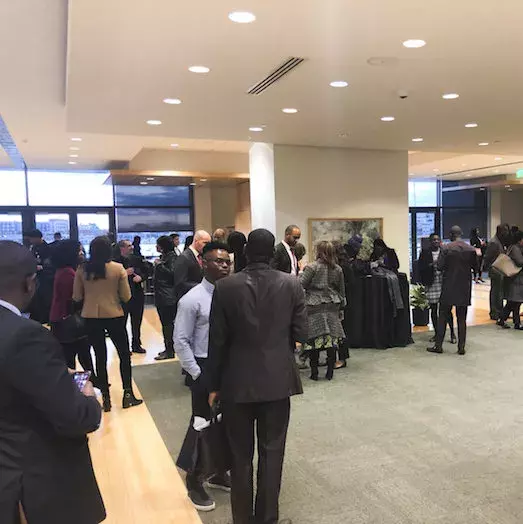
First Student-run Africa Business Conference Stresses Connectivity, Networking
It is the second largest continent in the world, bigger than the United States, China, and Europe combined. Its $1.4 trillion in consumer spending surpasses that of a more populous India. It is poised to become the world’s largest free-trade area, with 400+ companies posting revenues in excess of $1 billion.
Yet the economic development and potential of Africa remains an under-told story on the world stage.
The Johns Hopkins Carey Business School’s student-run Africa Business Club is hoping to spark a change in the narrative. That was the thrust behind a previous year’s Africa Business Conference, sponsored by the club and held at Carey’s Harbor East campus January 24 and 25, 2020. Building on the momentum of the Mzuzah Convergence 2018 Conference, also held at Carey, this year’s conference brought experts and policy-shapers on African development together with faculty, students, alumni, and the Carey community at large.
The conference set out to achieve a number of goals, chief among them to educate, connect, and show curious, like-minded people in the region and beyond, the instrumental role Johns Hopkins has in advancing the reality of African business.
More than 100 people from the African continent and diaspora attended the conference, along with representatives from other Johns Hopkins divisions in addition to Carey, including SAIS, the Krieger School of Arts and Sciences, the Whiting School of Engineering, the Bloomberg School of Public Health, the School of Medicine, and the School of Nursing.
The conference’s theme “Africa’s Place in an Increasingly Global Network,” featured five panel discussions tethered to that focus, including the Plenary Panel, Afro Tech, Energy & Infrastructure, Healthcare Innovation, and Africa-China Relations.
Keynote speaker for the conference was Eleni Gabre-Madhin, chief happiness officer, Blue Moon (Ethiopia’s first youth agriculture business incubator), and former CEO of the Ethiopia Commodity Exchange (ECX). Her comments spoke to the power of social media in connecting people and spreading ideas, especially in relation to the burgeoning economic opportunities in Africa. “I refer to the current generation as ‘Generation C’ for connected, because through the power of social media dreams and ideas are no different,” she said. “Once in a while a great idea becomes a company that can change the world,” she added.
Rhoda Weeks-Brown, general counsel and director of the Legal Department, International Monetary Fund (IMF), was one of three plenary speakers. Her focus was on the critical importance of making connections, especially early in one’s career. “Your network is your net worth,” Gabre-Madhin told those in attendance. She then challenged her audience: “Are you tapped into the right networks to effect change? Do you have the humility to build it? That’s why we need more conferences like this to talk and to work through these issues.”
In all, 20 speakers from Africa and its diaspora spoke at the conference.
Ernest Nyarko (MBA ‘20, Dean’s Scholar); along with James Gyenes (MBA ‘20); and Mahamed Konfrou (MBA ‘20) served as conference co-chairs, and along with other student volunteers worked tirelessly over the past number of months to make the conference a reality. “The Africa Business Conference here at Hopkins is an engine,” Nyarko observed, “one that translates ideas into conversations and conversations hopefully into actions that advance awareness and pursuit of business and careers in Africa starting with Hopkins.”
Already, Nyarko and his student colleagues are looking toward the future. “Our club plans to make the Africa Business Conference at Hopkins an annual affair … We are working toward a case competition and career fair that we hope will connect startups and businesses in emerging markets in Africa with students at Hopkins,” he said. Nyarko added that a possible student trek to these emerging markets is also an aspiration of the team’s.
The Carey Business School’s Africa Business Club exists to champion business and careers in Africa across the Johns Hopkins community. Its activities are professional, educational, and social in nature, and are open to all members of Johns Hopkins. At the core, the club is driven by a group of graduate students with a passion for the continuing economic, cultural, and social development of Africa.


